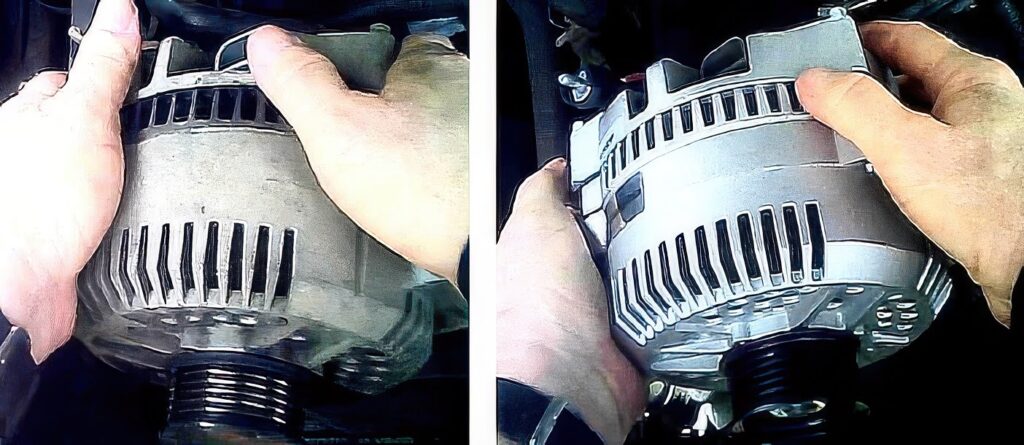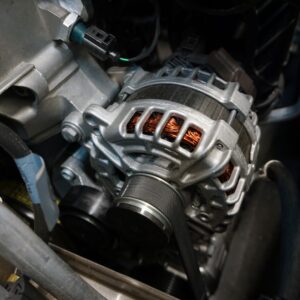Modern vehicles draw far more power than they did a decade ago, and the alternator sits at the center of that demand. When it weakens, some common symptoms you’ll notice include unstable voltage, dim lights, and a battery that won’t stay charged. Replacement prices vary widely with vehicle design, part choice, and how buried the unit is in your engine bay.
This guide lays out realistic up-to-date numbers, explains why quotes differ, and shows where you can trim costs without inviting do-overs.

How much does it cost to replace an alternator?
Expect a typical mainstream vehicle to land around $700–$1,000 installed, with labor commonly $180–$270 and the alternator itself $500–$750. Those figures reflect large, current U.S. estimate datasets and exclude taxes, shop fees, and belt/tensioner add-ons. Examples from common models (Camry, RAV4, Corolla) often clock in between $500 and $1,500 depending on access and amperage spec.
At the high end, luxury packages, high-output units, and certain European platforms (especially with start-stop or 48V belt-starter-generators) can push the total well above $1,500, and $2,000+ isn’t unheard of.
Tip: If your quote looks out of range, check whether it includes a new belt, new tensioner/idler, and the refundable core charge (some shops bundle these silently).
What drives alternator pricing?
Here’s what actually moves the needle, beyond generic “make and model” advice.
- Amperage rating & duty cycle: Stock alternators often span ~60–120 amps; vehicles with heavy electrical loads or add-ons may need higher-output units, which cost more. Performance/high-output options (130–300+ amps) are priced at a premium. Note that some light truck diesel packages have more than one alternator.
- Packaging & access: Some engines place the alternator up top with open access (low labor); others require removing cooling fans, undertrays, or even axles (higher labor). Mainstream labor quotes usually cluster around 1–2.5 hours.
- Control strategy: Many late-model vehicles use “smart”/variable-voltage alternators for emissions and efficiency; parts pricing is higher than old fixed-voltage designs. Start-stop systems and 48V mild hybrids use integrated starter-generators (BSG/BAS), which are pricier.
- New vs. remanufactured & core charge: Reman units are common and usually cheaper; you’ll pay a refundable core deposit unless you return a rebuildable old unit.
- Aftermarket electrical add-ons: Big-draw audio or auxiliary lighting can justify stepping up to a higher-amp unit and upgraded wiring—again, more cost.
How Much are Alternators?
For conventional 12-V systems: quality reman or new OE-equivalent units typically price in the $350–$800 range before labor for mainstream vehicles, while high-output or specialty units frequently run $600–$900+ just for the part. Dedicated high-output catalog pricing backs up that step-change.
Note: If you see a bargain that’s far below typical ranges, check warranty terms, amperage, mounting ear geometry, and connector style.
Related Add-ons You Might See On The Estimate
A charging-system service often snowballs into small, sensible extras:
- Serpentine/“alternator” belt: Many shops recommend replacing an older belt while it’s off; expect roughly $70–$200 installed depending on routing and access. Parts typically run $25–$120.
- Tensioner or idler: If the pulley bearing is noisy or the tensioner is weak, replacing it prevents squeal and slippage on your new alternator. (Pricing is vehicle-specific; ask for line-item labor overlap.)
- Battery: If repeated deep discharges have damaged it, you may need a replacement to avoid cooking the new alternator by overworking it. (Any reputable shop will test both before handing you the keys.)
How Long Do Alternators Last and What Shortens Their Life?
Most last 7–10 years or ~80,000–150,000 miles, with wide spread based on heat, short-trip use, and battery condition. Prolonged heat and chronic low batteries force the alternator to work at higher output more often, wearing bearings and diodes. It’s not unusual to see units surpass 200k miles in gentle duty, but planning within the typical window is realistic.
Tip: Keep your battery healthy (proper spec, clean terminals). An alternator is a maintainer, not a charger; using it to “recover” a dying battery every commute shortens its life.
How Much Does it Cost to Fix an Alternator (Instead of Replacing it)?
Voltage regulator only: typically $330–$533 total (parts + labor), based on national estimator data.
Complete rebuild of a conventional 12-V alternator (done by an auto-electric shop): commonly $200–$400 depending on what’s replaced (brushes, bearings, rectifier/diodes) and local labor rates.
Caveats:
- On many late-model vehicles with “smart”/computer-controlled units, shops don’t do piecemeal repairs and will quote a full replacement instead.
- If diagnosis shows multiple internal failures (e.g., bad regulator and noisy bearings/diodes), repair costs can approach or exceed a replacement price—at which point most shops recommend swapping the unit.
On traditional 12-V alternators, targeted repairs (regulator, rectifier, bearings) can be economical if parts are available and access is easy. In practice, most retail shops swap complete units for reliability and warranty reasons; labor duplication for a comeback is costly. On 48-V BSG/BAS units and many smart alternators, component-level repair is uncommon and replacement is the norm.
When repair makes sense: fleet/enthusiast contexts with in-house bench testing, or older vehicles where the alternator is externally regulated and easily serviced.
DIY or Pro?
The mechanical steps are straightforward, but safe battery handling, belt routing, torqueing brackets, and post-install voltage checks are equally important. If your alternator is buried—or your vehicle uses a smart/48-V system—treat it as a pro job.
If you DIY, follow this sequence:
- Save radio/seat memory if needed; connect a memory saver if specified by your manufacturer.
- Disconnect the negative battery cable; on smart alternators, wait the specified sleep time before unplugging harnesses.
- De-tension the belt and photograph routing.
- Unplug the field/monitor connector and main B+ cable; cap the cable to prevent accidental ground.
- Remove mounting bolts and lift out the alternator.
- Compare clocking, pulley, and connectors to the replacement; transfer any brackets.
- Reinstall, torque hardware, route the belt correctly, and reconnect the battery.
- Verify charging voltage and ripple at idle and under load; look for ~13.5–14.5 V on conventional systems. (Variable-voltage systems will modulate by design.)
Tip: 48-V systems require manufacturer procedures and PPE. If you see orange cables or “48V” labels, stop and consult OE service info.
How to Get a Trustworthy Quote
Price the job two ways—with and without belt/tensioner—so you can make an informed choice while the front end is apart. Always ask whether the estimate includes the core charge and what credit you’ll receive when you return your old alternator.
To compare apples to apples:
- Use a national estimator to sanity-check your zip-code labor/parts range.
- Verify the amperage rating on the quote matches your build; mismatched low-amp units can undercharge with heated seats, defrosters, and stereo on.
- If you’ve added audio or lighting, ask the shop to size the unit accordingly and discuss upgraded charge cables/grounds.
- For European start-stop or mild hybrids, confirm whether you’re dealing with a BSG/BAS; prices and procedures differ materially.
Quick reality check examples:
Any information provided on this Website is for informational purposes only and is not intended to replace consultation with a professional mechanic. The accuracy and timeliness of the information may change from the time of publication.
































